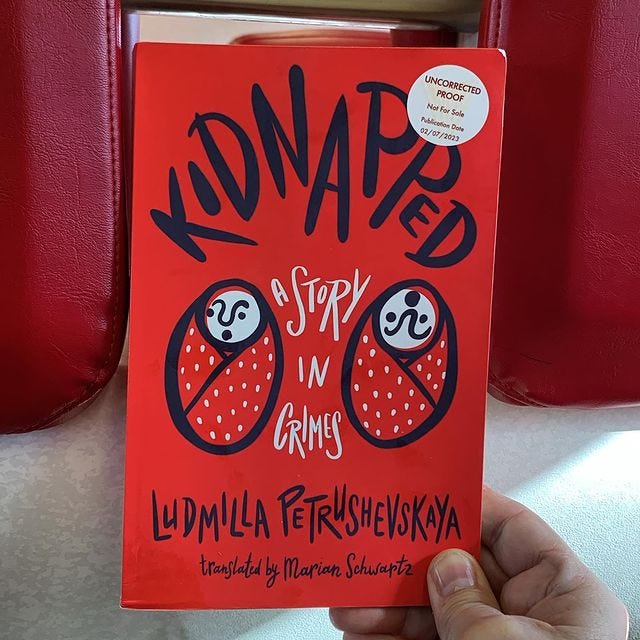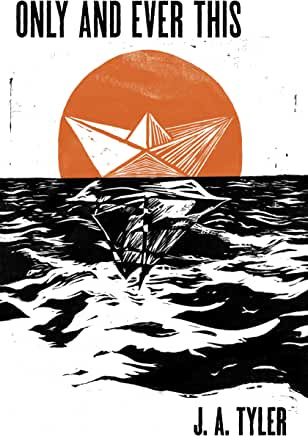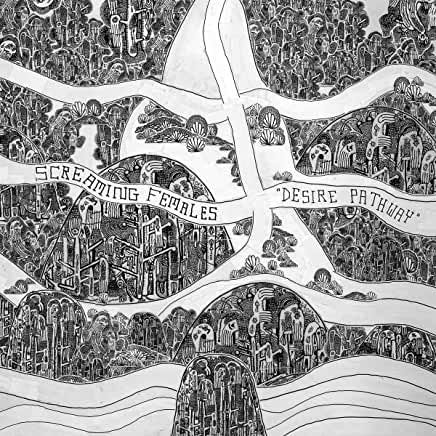Coming Back To You
bonus book & music links, plus recommended music by Screaming Females, recommended books by Ludmilla Petrushevskaya & J.A. Tyler, and a playlist of the best new music
You might have noticed there have been no new posts on Largehearted Boy this week. After a server migration late last week, some software issues arose and will be fixed this weekend (there will be twice as many author playlists next week!).
In light of the lack of daily book & music news & links on the site, I’m adding bonus links to this week’s subscriber newsletter. Also, this newsletter is open for everyone to read, complete with the weekly playlist of new & interesting music and books & music I have been enjoying.
Book Links:
An excerpt from Rebecca Makkai’s new novel I Have Some Questions for You
First draft interviewed Matthew Salesses
You know people often say that the beginning is the last thing that you write for a novel, or the last thing that you get right for a novel. And I found that often to be the case. And so, I don’t think it’s about understanding really what the novel is going to be, but more about imagining where it might go. When you’re writing that beginning, you know, I’m always trying to pack in a lot of possibility and a lot of rules for what it looks like to read the book, and a lot of voice and a lot of characterization and a lot of expectations for what could go on, the stakes, all of these things have to go into the beginning of a novel.
Leigh Stein on the value of BookTok
I’m no BookTok tourist. I’ve lived here for nine months. As a chronically online millennial, I’ve become a translator between the readers on BookTok and the literary community that looks down upon them. On TikTok, I post a video about Mary Ruefle that gets forty thousand views and yields comments like: “this just gave a whole new perspective on my entire existence.”
Dizz Tate talked books and writing with Bustle
When I read books or writing that I love, it feels like it fires off certain impulses in my brain. If something just isn’t working with my writing, I’ll just close my laptop screen and read 10 pages of my favourite book. It’s a respite from your own writing but also a source of ideas and inspiration. I read The Virgin Suicides a few times as, like Brutes, that used a chorus voice.
0s & 1s interview with author Deepti Kapoor.
I'm aware of the Kirkus review. I didn't read it. I was sent it and opened it and my eye first fell on a line that said something like "a whole lot of fun" and I shut the laptop and said fuck that, if that's what you take from the novel then I'm disregarding the entire review. And that kind of reminded me that reviews aren't really for the author and it's useless looking at them.
Asale Angel-Ajani discussed her debut novel, A Country You Can Leave, with Shondaland.
When we get too far away from the places that we’ve grown up, we can sometimes say, “Was that really like that? Did I really experience this?” But at the same time, my characters also wouldn’t let me rest in my own memories. They are pretty demanding in terms of keeping me in their reality, which was completely generated by their own lived experiences on the page. My characters are really very real to me in a lot of ways.
Jai Chakrabarti recommended books that feature characters that go against their astrological signs
In my story collection A Small Sacrifice for an Enormous Happiness, I explore these rifts in our astrology through characters who through choice or chance transition from their birth families to cultivate chosen families, finding new ways to make it in the margins.
Richard Thomas shared storytelling tips at LitReactor
One way to look at your storytelling is like putting together a huge puzzle. If you never saw the lid—and didn’t know it was a field of flowers or a cloudy sky or a deep sea illumination—it would take you a while to figure that out. Each piece you put into its rightful place adds to the picture.
Music Links:
Screaming Females broke down every track of their new album at Flood
“It’s easy to think being in a three-piece rock band might be really limiting, but when you sit down and think about all the different things you can do with just drums, bass, and guitar, it’s kinda overwhelming,” says Paternoster. “There’s new things we can try all the time. It’s literally endless. I try, actually, not to think about it.”
The NYT profiled singer-songwriter Iris Dement
For the new album, DeMent tried something that hadn’t clicked before: co-writing. “I’ve never really written with people,” she said. “John Prine and I tried to write a song together, and we have some great stories to tell but no songs. If I can’t write a song with John, then who can I write a song with? It just wasn’t my thing.” But she had better luck with her stepdaughter, Pieta Brown, a distinguished singer-songwriter in her own right.
The Creative Independent interviewed musician and composer Angel Bat Dawid.
I knew that music had an effect on me that I didn’t have words to express. Just getting obsessed with sound and, I’m dating myself, wanting to rewind the cassette over and over again. I always gravitated to things like that. I’ve always been an imaginative, adventurous child and music always allowed me to explore that.
Michele Catalano on how the Grateful Dead helped her be herself
What we had in common with each other, besides the lack of confidence that would have allowed to possibly join a more popular group of friends, were two things: pot and the Grateful Dead.
Courtney Marie Andrews covered Leonard Cohen & Shania Twain at Aquarium Drunkard
Lucero’s Ben Nichols on the band’s new album.
“It was supposed to be a keep-it-simple-stupid rock ’n’ roll record, but the lyrics are always a different story. Maybe because I wasn’t thinking about it, maybe this is a more personal record than I intended, a more telling record than I was expecting it to be.”
Aquarium Drunkard interviewed singer-songwriter Jenny O.
AD: You have a really clear, piercing voice that just cuts through the sonics. Is there anything you can say about how you present your voice or how you make it sound like that?
Jenny O: No. I sing how I sing. And I actually try to make it not sound childlike, but I can’t help that I sound, at times, childlike. But it took me a long time to accept my voice, my feminine voice. I grew up listening to men, and the male voice is just accepted. The female voice isn’t always. People will say, oh I don’t like it. This is maybe not said as much anymore. People would say that they don’t like my voice or say things about my voice about it being high or annoying or whatever. I’m getting off topic. It took a long time for me to accept the way that I sing.
UPROXX interviewed Miss Grit’s Margaret Sohn
What are four words you would use to describe your music?
Calculated, reserved, droplet, butterfly.
This week’s Playlist of New Music:
Books & Music I’ve Been Loving This Week:
Ludmilla Petrushevskaya’s novel Kidnapped is a multi-generational pageturner from the Russian bestselling author.
J. A. Tyler’s surreal novel Only and Ever This is a marvelously dark and lyrical fable of pirates, mummies, ghosts, and vampires.
Screaming Females’ Desire Pathway might be the year’s most powerful rock album. The trio sounds heavier than ever, even in the band’s 17th year together.








